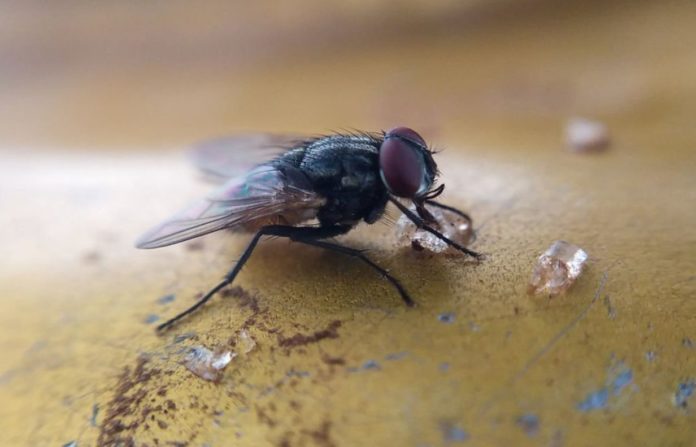Who knew fruit flies are gregarious animals?
Who would have thought that when they were in danger, they would listen to the cues given by other flies?!
Does a fly act like a “sheep” when threatened?
Does the group always have the same effect on a threatened fly, or does it depend on the level of threat?
Understanding how social context affects an individual’s behavior toward danger is a goal of research from the Behavioral Neuroscience Laboratory at the Champalimaud Foundation in Portugal.
They have previously demonstrated that when fruit flies are in a group and confronted with an unavoidable threat, they drop their defenses compared to when they are alone. They also discovered that if the other fly freeze, so does the individual; when the group resumes movement, the individual rapidly follows. Being aware of the flies around you seems to give you a sense of safety.
In their most recent study, which has just been published in Frontiers in Ecology and Evolution, researchers from this lab show that a fruit fly’s responses within a group rely on the severity of the threat. At the start of the study, there were conflicting views: on the one hand, some believed that in the presence of a greater threat, the fly would pay less attention to the group because it would concentrate all of its attention on its perception of the threat; on the other hand, others believed that in the presence of a greater threat, the flies would pay more attention to their surroundings, including the behavior of other flies.
Clara Ferreira, a postdoctoral researcher, and Marta Moita, the lead investigator, respectively, conducted an innovative experiment to test a fly’s reaction to the same social cues but at various levels of threat.
In this experiment, one group of flies was genetically altered so that they could not see the threat stimulus (a dark circle that approached the individual), while another group of flies had a certain type of visual system neurons activated by optogenetics (a technique that combines light and genetics, capable of activating and inactivating neurons). This meant that the fly could be exposed to different social stimuli that didn’t depend on the level of threat.
The conclusions were clear: flies respond more to social evidence provided by the group at increasing degrees of threat. “We know that the freezing response to the threat is energetically expensive, so it is of the utmost importance to limit this response to what is strictly necessary,” Clara Ferreira says. “Attunement with other animals allows the individual to respond quickly to the threat and be able to return to normalcy as soon as possible .”
“In the future, we would like to explore this idea further,” says Marta Moita in her conclusion. “Specifically, to understand how the attunement between animals in a group allows for a more adjusted response to the threat and what neuronal mechanics underlie this attunement.”
Image Credit: Getty
You were reading: Flies Follow Social Cues Just Like Us – New Study Shows
